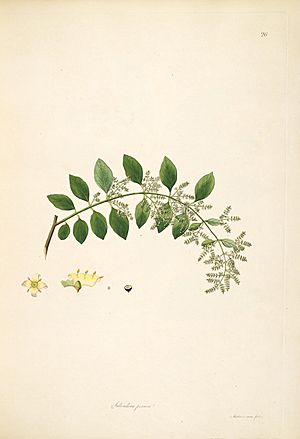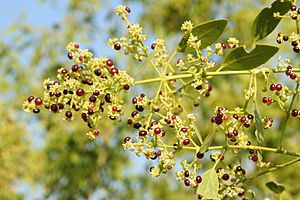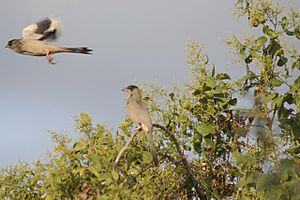Salvadora persica facts for kids
Quick facts for kids Salvadora persica |
|
|---|---|
 |
|
| Conservation status | |
| Scientific classification |
|
| Kingdom: | Plantae |
| Clade: | Tracheophytes |
| Clade: | Angiosperms |
| Clade: | Eudicots |
| Clade: | Rosids |
| Order: | Brassicales |
| Family: | Salvadoraceae |
| Genus: | Salvadora |
| Species: |
S. persica
|
| Binomial name | |
| Salvadora persica |
|
| Script error: The function "autoWithCaption" does not exist. | |
Script error: No such module "Check for conflicting parameters".
The Salvadora persica is also known as the toothbrush tree. It's a small evergreen tree that grows naturally in India, the Middle East, and Africa. People traditionally use its branches as a natural toothbrush called a miswak. The World Health Organization even mentions it for keeping your mouth clean and healthy.
Other names for this tree include arak, jhak, pīlu, and mustard tree.
Contents
What is the Toothbrush Tree?
The Salvadora persica is a small tree or shrub. It often has a bent trunk and usually grows about 6 to 7 meters (20 to 23 feet) tall. Its bark is rough and cracked, looking whitish. The roots have a pleasant smell, like cress or mustard. They also taste warm and spicy.
The leaves make a crisp sound when you step on them. The tree grows small, red, juicy fruits in bunches. These fruits are edible, but they have a strong taste.
Where Does it Grow?
This plant is found in the Middle East and Africa. It likes to grow in desert areas where rivers used to flow, along riverbanks, and in grassy savannahs. It can handle very salty soils. It can even grow with only a little rain, but it prefers places where it can easily reach groundwater.
How People Use the Toothbrush Tree
The Salvadora persica stick, called a miswak, is very popular for cleaning teeth. People use it across the Arabian Peninsula, the Iranian Plateau, and in many Muslim countries.
- People have used toothbrushes made from the roots and small branches for over 1,000 years. This is especially true for Islamic people in India, Arabia, and Africa.
- Scientists think that certain things in the bark and wood help prevent cavities. These include things that stop bacteria from growing and forming plaque on teeth.
The fresh leaves of the tree can be eaten in salads. They are also used in traditional medicine. The flowers are small and smell nice. They are sometimes used to make people feel more energetic or to help with digestion. The small berries can be eaten fresh or dried.
The wood from the Salvadora persica can be used to make charcoal and for firewood. In Namibia, the mustard bush is used to feed cattle, especially when there is not much rain. The seeds can also be used to get an oil that acts like a soap.
As of 2009, there were eight Salvadora persica plants being protected in special gardens by Botanic Gardens Conservation International.
See also
 In Spanish: Árbol cepillo de dientes para niños
In Spanish: Árbol cepillo de dientes para niños
 | Anna J. Cooper |
 | Mary McLeod Bethune |
 | Lillie Mae Bradford |




